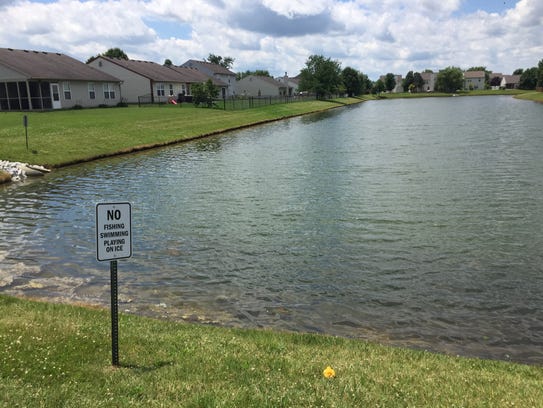
Beth Warren
LOUISVILLE — Shalom Lawson, an 8-year-old Louisville boy who loved hugging people he just met, wandered from a relative's home last summer and drowned.
He had autism, a disorder that causes many children to walk off. "Elopers,"as they are called, are especially drawn to water and are unaware of the risks.
"Water makes them feel calm, but water is very, very dangerous," said Shalom's mother, Magdalene Lawson, who came to America from West Africa with her husband, Charles.
She told Courier Journal she tried to protect her son by locking her bathroom to keep him from filling up the bathtub. She feared he would burn himself or drown. And she said she kept an alarm on her front door that would beep if he tried to get out.
More: Autism is not my identity: How a Cave Creek teen lost his diagnosis
More: Autistic boy gets huge birthday party after no one RSVPs
But on a visit with family near Indianapolis last July, Shalom wandered off and drowned in a retention pond.
The story of Shalom's death is being shared with MetroSafe dispatchers and others who respond to emergencies in the Louisville area by trainers who are working with them on how to help people with autism.

"The police, fire department and EMS are in our society to be that resource to every individual," said Deborah Morton, executive director of Families for Effective Autism Treatment in Louisville. She said a tense situation can turn chaotic if emergency personnel don't know how to respond.
In a July incident that sparked national outrage, a North Miami police officer fired on a severely autistic man who sat in the middle of the road. A motorist reported seeing what she thought was a mentally ill man with a gun, according to the Miami Herald. The man's caregiver rushed in and complied with police orders to get on the ground with his hands up, but the autistic man continued to sit in the road playing with a silver toy truck. The officer mistakenly shot the caregiver in the leg.
A new state law that took effect in October requires autism training for Florida officers.
"To our knowledge, things like this haven't happened in Louisville and we want to keep it that way," said Heidi Cooley-Cook, a training coordinator with the University of Louisville's Kentucky Autism Training Center.
Autism occurs in all racial, ethnic and socioeconomic groups, but it is about 4.5 times more common among boys than girls, according to the Centers for Disease Control and Prevention.

Autism spectrum disorder ranges from mildly affected and highly functional — people you may work with and not realize they have the disorder — to severely disabled and non-verbal. A person might know an impressive amount of trivia about a favorite subject, like World War II, but not know their address or phone number.
"If someone on the autism spectrum is approached by someone they're not familiar with, they might not respond or take longer to respond," Cooley-Cook said. "They might not look in the eye, make eye contact."
Carrollton, Ky., Police Chief Michael Willhoite said that after he and his officers completed the two-hour training, he realized he could have handled some interactions better.
“Police are trained to take control of a situation. With an autistic person, just going in and taking control is not the ideal situation.”
Carrollton, Ky., Police Chief Michael Willhoite
"Police are trained to take control of a situation," the chief said. "With an autistic person, just going in and taking control is not the ideal situation."
He added, "It's not that they're just being defiant. There's a reason. Try not to escalate the situation by being forceful or being hands on. Just take the time and use a soft voice."
Willhoite said he hopes first responders throughout Kentucky will get the training.
Louisville Metro Police officers will be trained starting in January.
"This is the kind of community cooperation that helps us to work more effectively and will benefit officers as they interact with the public," Louisville police Chief Steve Conrad said in a statement.
Chad Greathouse, a Louisville Fire captain and father of an autistic teen, is teaming with Cooley-Cook to train first responders in the Louisville area, Southern Indiana and other parts of the commonwealth.
He said he worries his 16-year-old son will have problems with police. He said people with autism don't always understand uniforms or authority. He has shown his son photos of police officers, patrol cars and badges, urging him to ask any questions he might have.
Some people with autism have complained of pain if touched lightly on the arm, Greathouse said. Others might stick their fingers in their ears or wear noise-canceling headphones to avoid loud noises, such as an officer shouting commands. They may even shout back or respond in a way that doesn't fit the questions or orders.
"I'm not blaming police," Greathouse said. "It's about opening their eyes."
The fire captain also has important lessons for his fellow firefighters.
Across the country, people with autism have been rescued from burning homes only to pull away and run back into the home — a place of comfort, Greathouse said. That's how a Portland man in his 20s died a few years ago, he said.
He is teaching fellow firefighters to make sure someone watches a person with autism after they have been rescued from the fire.
For more information about autism, visit the CDC website's at cdc.gov/autism.
| Attachment | Size |
|---|---|
| 20180112e.jpg (37.51 KB) | 37.51 KB |